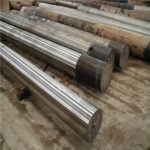1.2345 X50CrVMo51 Hot Work Tool Steel
1.2345 is a 5%chromium hot work tool steel designed particularly for applications requiring extreme toughness combined with good red hardness.It provides an extra margin of safest in tools subject to heavy hammer blows,and those tools containing deep recesses or sharp corners.While 1.2345 has been designed primarily as a hot work tool steel,it has been used in many cold work applications where extra toughness is required at the sacrifice of some wear resistance.
We can provide more services:
1、Hardening and tempering
2、Vacuum heat treatment
3、Polished bright surface
4、Milling bright surface
5、CNC machine
6、Deep drilling
7、Cut into small pieces
8、Make it closer to the mold
Welcome to inquiry price from drawing
Cutting:
Precision cutting to standard dimensions
Custom cutting according to client specifications
Surface Grinding/Polishing:
Thickness tolerance: -0 to +0.1mm
Flatness: 0.01/100mm
Surface roughness: Ra ≤1.6 or Rz ≤6.3
Applications
1.2345 has been used primarily for tools requiring resistance to softening at elevated temperatures.Such tools include forging dies and punches,die-casting dies,aluminium extrusion dies,hot heading dies,piercing and forming punches,etc.
Chemical composition (wt.%)
| C(%) | Si(%) | Mn(%) | P(%) | S(%) | Cr(%) | Mo(%) | V(%) |
| 0.48-0.53 | 0.80-1.10 | 0.20-0.40 | Max 0.030 | Max 0.030 | 4.80-5.20 | 1.25-1.45 | 0.80-1.00 |
Smelting Option
1 EAF: Electric Arc Furnace
2 EAF+LF+VD: Refined-smelting and vacuum degassing
3 EAF+ESR: Electro Slag Remelting
4 EAF+PESR: protective atmosphere Electro Slag Remelting
5 VIM+PESR: Vacuum induction melting
Forming Option
1 Hot rolling process
2 Hot Forging: Electro-hydraulic; High-speed-hydraulic; Oil-hydraulic; Precision-forging
Heat-treatment Option
1 +A: Annealed (full/soft/spheroidizing)
2 +N: Normalized
3 +NT: Normalized and tempered
4 +QT: Quenched and tempered (water/oil)
Suface Option
1 Black Surface
2 Grounded: Bright but rough ; Not precision
3 Machining for plate: Bright and precision; Little turning scar
4 Peeled/Turned: Bright and precision; Little turning scar
5 Polished: Very Bright and precision size; Not turning scar
Other Services
1 Cutting: Small pieces
2 CNC Machine: Produce as your drawing
3 Package: Bare/Nylon/Canvas/Wooden
4 Payment:T/T, L/C, O/A(request credit)
5 Transport:FOB/CFR/CIF/DDU/DDP (train/ship/Air)
Mechanical Properties
| Rp0.2 (MPa) | Rm (MPa) | Impact KV (J) |
Elongation A (%) |
A Z (%) | Delivery | Hardness HB |
| 421 (≥) | 737 (≥) | 42 | 22 | 34 | Solution & Aging, Ann, Ausaging, Q+T | 321 |
Physical properties(average values)at ambient temperature
Modulus of elasticity[103x N/mm]:215
Density [g/cm3]:7.70
Thermal conductivity[W/m.K]:25.0
Electric resistivity[Ohm mm/m]:0.52
Specific heat capacity[J/g.K]:0.46
Soft Annealing
Heat to 760-8200C,cool slowly in furnace.This will produce a maximum Brinell hardness of 250.
Stress Relieving
To relieve machining strains for greater accuracy in hardening,first rough machine,then anneal
below the critical 649/677C a minimum of one hour at temperature,and cool very slowly,
followed by finish machining.
Hardening
Harden from a temperature of 1000-1040C followed by air,oil warm bath(450-550%C)
quenching.Hardness after quenching is 54-58 HRC.
Forging
Heat slowly and uniformly to a temperature of between 1093/1135C and forge.Do not work
the steel below 927C.Reheat as often as necessary.
Machinability
The machinability of 1.2345 may be rated between 55%and 65%of a 1%carbon water
hardening tool steel,or about 40%to 50%of B1112.
Weldability
To salvage tools and dies by welding,preheat to 538c in a furnace and weld with uncoated arc
equipment(atomic hydrogen or heliarc).Keep the temperature of the die above 316C at all
times by reheating until the welding is completed.Upon completion of the weld,return the
work piece to the preheating furnace,equalize,and cool in the furnace.Welding should be
performed in the annealed condition.However,if welding is performed in the hardened
condition,the tool should be retempered at 538C after hardening.The electrode material used
in the weld rod should be of similar analysis to the base material.

